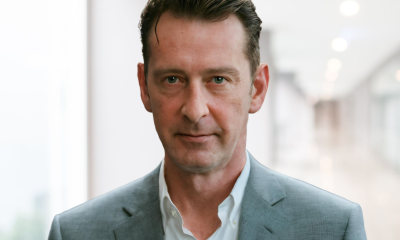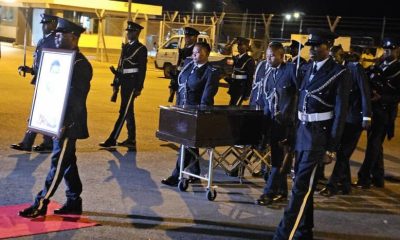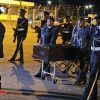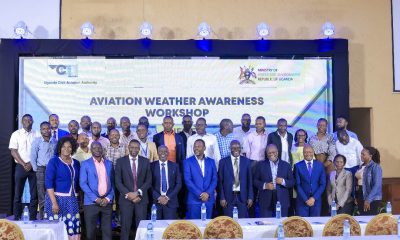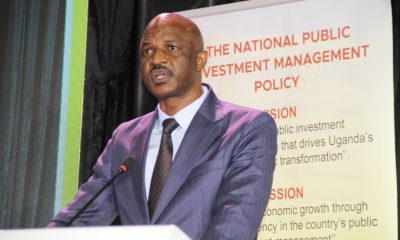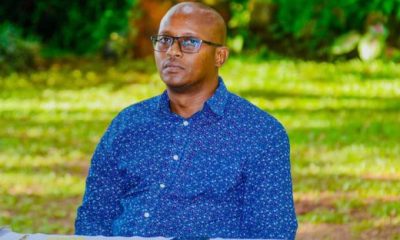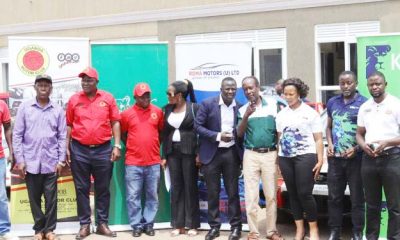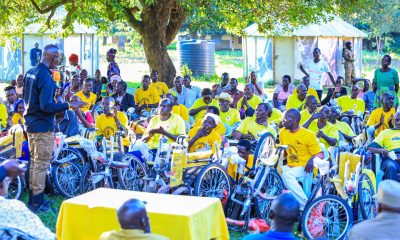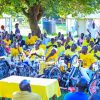News
Briton Robin Galan brings joy to rural Wakiso through education
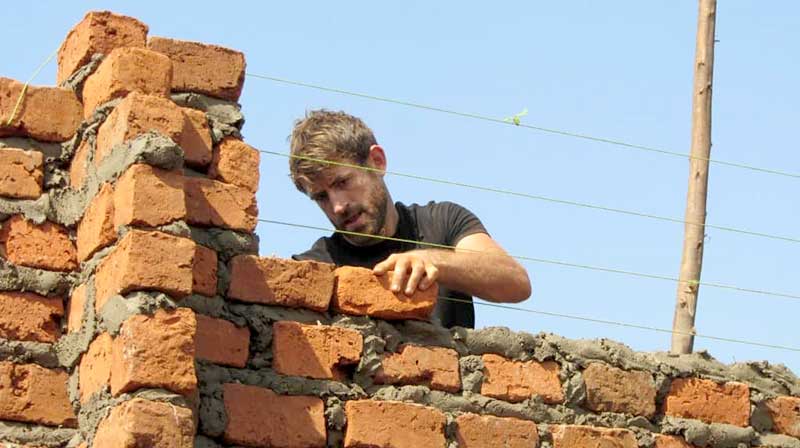
Mr. Robin Galan has used his passion, energy and great resource mobilisation skills to build Tasaaga primary school
The year was 2007 when Bruhan Mubiru, placed an almost blind proposal on the internet requesting for assistance from anyone anywhere in the wide world to support his dream of building a school for the poor people.
Mubiru’s initial plan was to start with a wooden structure for a school in Sitabaale village in Kiwenda, Nansana Municipality.
Fortunately, Mubiru got more than he bargained for when Robin Galan, a British national responded to his desperate call to transform his vision beyond a wooden shell into a permanent concrete structure.
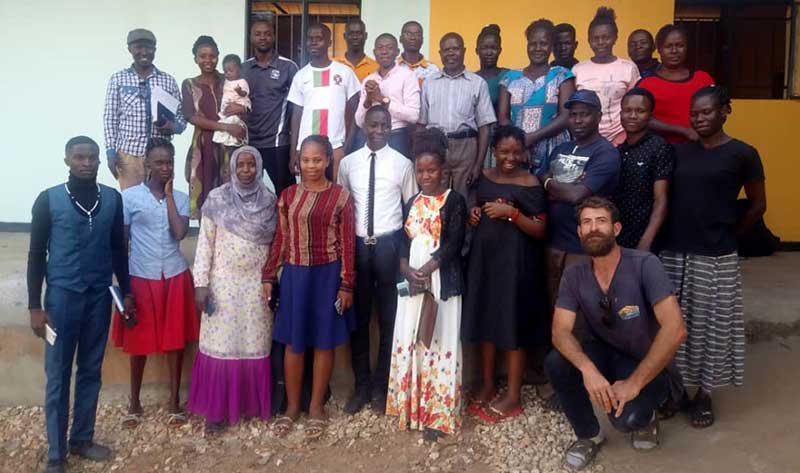
Mr. Robin Galan (squatting right) with the team that runs Tasaaga Primary School
In an interview with The Sunrise, Mr. Galan talks about how he has combined his prefessional building skills, enormous personal sacrifices to achieve greater satisfaction by ensuring that children from less privilleged backgrounds in a rural village in Wakiso, get access to better education.
Through his personal involvement in the construction of Tasaaga primary school, Galan is proud about his achievements in the humble village of Sitabaale.
But before our conversation, let’s share some of the basics of the school.
Once he bought into the dream of building the school, Galan got straight to work by mobilising resources to build the first concrete structure of the school. When completed, the school was inaugurated in 2008 by President Yoweri Museveni.
The last sixteen years have seen an unbelievable transformation of the education landscape in Sitabaale. From a wooden school structure, the community now has a full fledged primary school, and a vocational education section for children who wish to join after primary seven.
The partnership between Mubiru and Galan has offered orphans access to entirely free education at the school, while those from relatively poor households pay a sustenance fee of UGX100,000 for day scholars and UGX250,000 for those in the boarding section.
With Mubiru in charge of its day to day affairs, Galan has ensured the school continues to serve its original mission of helping poor families. Every year, Galan makes at least one trip to Uganda to give it a face lift, as well as participate in chatting a way forward for its continuity.
The community leadership of Sitabaale is appreciative of Galan’s selfless gesture as purely motivated by the need to lift the education standards in the rural area.
Mr. Mathias Bugembe, the village chairperson of Sitabaale noted that fellow residents are very proud of the school and the efforts of Mr. Galan.
“Before Bruhan (Mubiru) brought his friend Robin to our school, Children were facing a challenge of moving long distances to access education. They could walk 2- 2 and a half miles to school. Because of this, some children would not reach school. They would spend the whole day collecting fruits and playing instead of school.” he said.
Below are excerpts of our Q&A interaction with Galan.
Qn. Why of all countries did you choose to come to Uganda?
Ans. I found a letter from Burhan on a website called idealists in 2007, I am not sure if it’s still there but it simply said we need a school and I couldn’t find any other opportunities that could challenge me so I came to see Burhan and see if things were legitimate. I stayed for a couple of weeks and when I decided that I liked the man and things were above board, I started building. I think he thought we were going to do a wooden structure but I got a little carried away. I left after the building was complete. It was after six months.
Qn. Volunteers usually come in teams, why did you come alone?
Ans. You think that time is very valuable but the truth is you need to have skills and qualifications to do something useful so I found it hard to find something to do and I didn’t want to come and be told in a team “we do this and that.”
Qn. Why did you change the plan of the building?
Ans. When I came, I saw what was available and I decided what was needed but it’s never enough. Never enough time for money. I know what we need and what I dream of and it is what I am going to aim for now. I am going to dedicate more time and more of my life to catching up with where we have fallen behind.
Qn. Don’t you feel like you’re neglecting your home duties?
Ans. I am a builder at home amongst other things and when I do a job I like to do it right. Temporary measures are not good. Building castles made of sand and get knocked down. This building alone takes a lot of maintenance, the climate is severe so every year, when I come back we do a bit more building, more painting and decoration.
Qn. What drives you to do this kind of work?
Ans. The inspiration I guess comes from wanting to share. If you have a big plate of food and the man you are seated next to has got nothing, the food doesn’t taste very good but when you share it then you both enjoy your meal. What I could accomplish back in England or France or Spain with the means that I have is not very much because I am not a rich man and here, at that time things were a lot cheaper than now and I built the school for the price of a second hand car. So there was something I could accomplish in six months.
Qn. What was your first experience like?
Ans. The building was simple enough. It was tough for a Mzungu because we are not designed for this type of climate but it was an interesting time of my life. I was overwhelmed by how much more there is and it would have broken my heart if I built something and enjoyed myself and then watch it not function so I was interested in a real school. So over the 16 years, I feel like we have accomplished that in different ways. We have learned from mistakes, we have ironed out a lot of problems that everybody has here, we are focused very much on security and lots of other problems that happen all around the world.
Qn. What makes you come back every year?
Ans. When I left, I realized the school is not just a building. It’s the teachers, the parents, the director, the lightning conductor, the toys, the amusements, everything. So, obviously we had many problems initially that we had to address. And I fell in love with Uganda. This is my country now. This is where my best friends are and the people I admire the most. I hope to move here. I have responsibilities back home but I have been coming once or twice a year.
Qn. Do you personally fund the school?
Ans. I am not a rich man. The problem is that when you are a Mzungu everybody thinks you are rich. I feel like in sixteen years we would have been able to do more but we struggle. Ever since the pandemic happened, we have taken many steps backward.
Qn. Are you satisfied with the academic performance so far?
Ans. I feel like what we have here inside these broken down buildings is a real functioning school that gets good grades, we have success stories and I feel that when I am here. I feel a little bit of satisfaction when I see the children actually learning because that’s what the school is for. I have always felt that if all the Americans had built a school for every church, this country would not have problems.
Qn. What challenges have you faced since 2007?
Ans. Sometimes it’s hard raising the funds. The bills are very high these days, the food and teacher’s salaries. I feel like we are at a self-sufficient stage. During the pandemic, me and my friend started a UK charity and started trying to raise more funds which is hard now because there is a hole in Mzungu wallet.
Our economy is not good and unfortunately two weeks ago our biggest donor passed away. She was the mother of my friend. So I have to work very hard now to try and find funding to replace that but what it has resulted in is that we have a good dynamic whereby we are self- sufficient as far as the running of the school.
Comments



